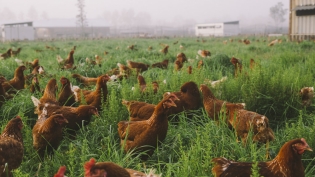Cracking the Egg Carton Label Code
Vegetarian Fed. All Natural. Cage Free. What does it all mean? The seemingly infinite labels found on egg cartons can be misleading and overwhelming. While some terms are federally or independently regulated, others are marketing ploys intended to confuse consumers. Let’s break it down:
MEANINGLESS MARKETING LABELS
All Natural, Naturally Raised: Unregulated, meaningless terms intended to give consumers an ill-gotten warm fuzzy feeling.
Farm Fresh: Another unrestricted term intended to bewilder. To confirm true freshness of store bought eggs, check the Julian date (see below).
Hormone/Steroid Free: USDA regulations already prohibit artificial hormones and steroids for egg-laying hens, so this label is meaningless.
Antibiotic Free: This label can be misleading as all eggs must be free of antibiotics per FDA regulations. However, some third-party certifiers have additional requirements about when and if hens receive antibiotics.
Local: Because this is a subjective term, there isn’t a legal definition for “local.” When in doubt, buy directly from your trusted neighborhood farmer.
USDA LABELS
USDA Certified Organic: This label means eggs meet the rigorous USDA organic standards through official third-party certifying agencies. It ensures hens are cage free and have outdoor access, requires specific feeds and prohibits various chemicals and antibiotics.
Cage Free: This voluntary label defined by the USDA indicates that hens can leave their cages to roam and access food and water. However, the amount of space isn’t specified and outdoor access isn’t required. Unless otherwise labeled, most cage free facilities are indoor facilities where overcrowding is not uncommon.
Free Range: Another voluntary and often unregulated label defined by the USDA: “poultry has been allowed access to the outside for at least 51% of their lives,” though space and time isn’t specified. Highly regarded independent organizations Certified Humane, American Certified Humane, and Animal Welfare have additional standards beyond the USDA’s.
Additionally, all USDA certified eggs are graded by:
• Egg quality: AA (highest quality), A, and B
• Weight: Peewee (1.25 oz.) Small (1.5 oz.), Medium (1.75 oz.), Large (2 oz.), Extra Large (2.25 oz.), and Jumbo (2.5 oz.)
• Julian Date: A three-digit code ranging from 001 (January 1) through 365 (December 31) indicating when the eggs were processed. The closer to the current date, the fresher the eggs.
DIET-RELATED LABELS
Vegetarian Fed: The most common diet-related claim on egg cartons, though it doesn’t reflect a hen’s natural diet. Chickens are omnivores and need protein such as bugs and grubs for a balanced diet; hens lacking protein may even cannibalize each other.
Soy-Free: An unregulated term that indicates that hens were not given any feed containing soy products.
THIRD-PARTY INDEPENDENT LABELS
Independent Grocery Store Certifications: Some grocery chains enforce their own quality standards through certified inspections. These certifications can include but aren’t limited to: Cage Free Plus, Outdoor Access and Mobile Houses on Pasture. Note that these labels are not regulated by the USDA and only apply to eggs sold through these specific grocery chains.
Non-GMO: Cartons with Non-GMO Project and Animal Welfare labels strictly maintain egg-laying hens have only been given a high standard, non-genetically modified feed.
Pasture-Raised: Implies hens are raised outdoors on pasture, but are housed indoors at night as protection against predators. The USDA does not regulate this term, though highly regarded independent organizations Certified Humane, American Certified Humane and Animal Welfare impose rigorous standards in their own labels.














